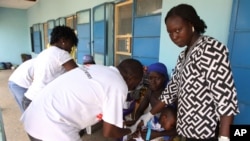Following a dramatic decline in malaria-related deaths between 2000 and 2013, World Health Organization data show more than 430,000 kids still die from the mosquito-borne infectious disease in Africa each year.
Despite the wide availability of Rapid Diagnostic Testing (RDT), many health workers in Nigeria, which carries a quarter of Africa’s malaria burden, neglect to use it.
Unlike conventional microscopy testing, in which lab technicians look for parasites in blood samples, 15-to-30 minute RDT procedures allow for diagnosis at the community level.
But according to a new study in the scientific journal Plos One, failure or refusal to use RDTs can lead to misdiagnosis and a waste of expensive malaria drugs.
"Most people [in Nigeria] wrongly assume that all fevers are malaria," says University of Nigeria Professor Obinna Onwujekwe, the study's lead author. "So once you have a fever, you’re most likely to get a malaria drug without diagnosis. That is wrong. Not all fevers are malaria."
Evaluating data compiled from 5,000 people across 40 communities in Nigeria's Enugu state, Onwujekwe's team looked at why health workers use RDTs less than 50 percent of the time, despite adequate training to administer the quick test.
Their conclusion is that drug sellers put profit ahead of patients.
"First-line drugs are the expensive artemisinin-based combination therapy," says Onwujekwe, explaining that RDT confirmation of a non-malarial fever means the patient wouldn't be required to buy the anti-malarial drugs.
"They want to make money," he says. "I mean, if somebody comes with fever and they say go home [because you don't have malaria], well, they lose money. ... Because of that, there’s a lot of waste. Drugs are wasted [and] quite a lot of money."
China and Vietnam grow most of the plants from which artemisinin is derived, but there is a growing market in East Africa. Despite negotiations for lower prices, the first-line drugs remain more expensive than other less effective treatments.
Onwujekwe says another problem is many health workers don’t trust the rapid diagnostic test. They would rather diagnose someone strictly on their symptoms. "If the test says it’s not malaria, they don't believe the test," he says.
So what happens when people are misdiagnosed and given the wrong treatment?
"There are so many consequences," he says. "That other illness can cause real damage, which may even lead to death. That’s one. Then, there’s the high economic cost for society. And they’re wasting the drugs. Then, number three, it can be development of resistance to malaria parasites if the drugs are not used properly."
With millions of people still at risk of infection, the WHO has called a move toward universal diagnostic testing a critical step toward eradication.
Onwujekwe's study says training health care workers on new procedures is not enough, and that government, NGOs, and U.N. agencies need work to change the old mindset about how to properly diagnose and treat patients.




